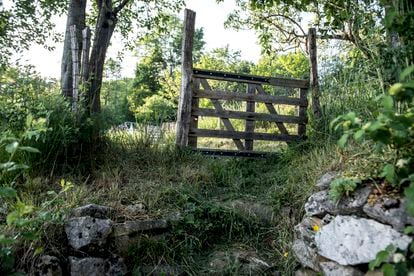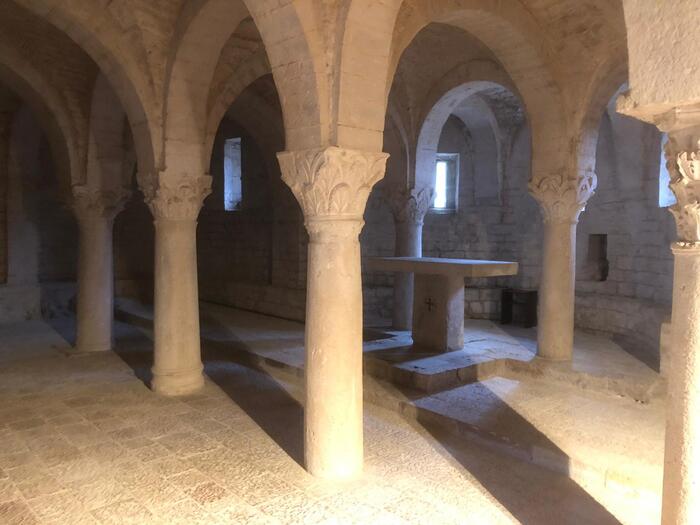For almost seven years, from September 2006 to July 2013, José Antonio Urrutikoetxea Bengoetxea,
Josu Ternera
, resided hidden and incognito in a stone house, at the foot of a mountain, at the foot of the French Pyrenees.
The place, which is accessed by a sloping dirt road, is called Ordas, and is within the municipality of Durban-sur-Arize, a small mountain village of 100 inhabitants without a bar or much coverage, settled in a valley crossed by a river
The neighbor who occupies the house next door, and who lives, among other things, by selling the chickens he raises and roasts on a traveling grill in the towns of the area, remembers seeing Ternera almost every morning of all those years getting up too early to go for a run or walk in the mountains, ride a bike, split firewood or garden.
At first they limited themselves to greeting each other from a distance, because Daniel Martín, who was the identity that Ternera used in that place, was,
according to the neighbor, a retired professor, reserved and little talkative.
Later they became friends.
During all that time, Ternera remained alone in the house on that remote farm without speaking to anyone other than a couple of neighbors, receiving no more visitors than his partner, and barely leaving the area.
He assures that at that time he no longer belonged to ETA.
On July 15, 2013, at six o'clock in the morning, the neighbor, who prefers not to give his name, woke up with an explosion and the screams and running of fifty hooded French policemen armed with machine guns and rifles who were looking for something or someone in Daniel's house.
Shortly after, he found out three things: that Daniel was not who he said he was, that his name was not what he said his name was, and that he had run away.
Firefighters and volunteers, clearing debris after the ETA attack in Zaragoza, on December 11, 1987. EFE
The biography of Urruticoechea, 71, currently on probation in France, is confused with that of ETA.
He entered when he was 20 years old and participated in the theft of the dynamite used in the murder of Carrero Blanco in 1973. The police consider that he became the maximum leader of the gang in 1987, in a particularly bloody stage due to the use of cars. bomb.
In 1989 he was imprisoned in France and transferred to Spain in 1996. In October 1998 he was elected a Basque parliamentarian and in 2000 the Supreme Court shelved his cases because they were already tried in France.
However, in 2002 the courts opened a new trial against him, accusing him, precisely, of being part of the ETA leadership that made the decision to put the car bomb in the Civil Guard headquarters in Zaragoza on December 11, 1987, which killed 11 people,
five of them children.
Ternera then fled from Spain.
He began a long period of playing cat and mouse with the police that lasted 17 years, until May 2019. All that time he lived hidden, in remote places, always masked in false identities, although there is no evidence that he used fraudulent documentation.
Jacques Palusci, also a neighbor of the Ordas farm, is the one who lent him the house.
“I had known his wife, Agnès Cerlo, for a long time.
I lived in Toulouse at the time and came to the Pyrenees only on weekends.
She asked me if she could leave the house to her friend, to spend a few days off, "Palusci told EL PAÍS last week.
The new tenant, Palusci explains, liked the place so much that he wanted to reach an agreement with the owner: he would take care of the house, keep it clean, cut firewood and tidy up the garden in exchange for being able to live there without pay nothing.
“I accepted.
When I went on Fridays or Saturdays, he brought him food on behalf of Agnès.
He didn't buy anything.
He never left the farm or its surroundings.
He had no car, no motorcycle.
He was not answering the home phone.
He didn't even have email.
No bank card.
He instilled in me the vice of sport, of the bicycle.
We talked about politics.
I had him for a left-wing person, but I never thought that he could be a criminal.
I also remember that we both really liked Paco Ibáñez”, he says.
Ternera didn't even come close to the village.
The inhabitants of Durban-sur-Arize do not recognize it.
Agnès, his partner, with whom he has a daughter, would visit him once a month at most, according to Palusci.
“They weren't your typical couple, the kind you see often,” he says.
The retired doctor insists that Ternera spent all his time in the vicinity of that remote farm, but he remembers a long absence, from November 2011 to February 2013. Ternera told Palusci that he was going to Paris to do a doctoral thesis.
In reality, he was in Oslo and was part of the ETA delegation that, after the announcement of the "definitive cessation of violence", aspired to meet with the new government of Mariano Rajoy to negotiate disarmament and the situation of the prisoners.
Negotiations never started and he was expelled from Norway.
Then he returned to his life as a false teacher on the farm in the Pyrenees.
Shortly after he was discovered.
Gate in the back garden of Ternera's house in Ordas through which, according to a neighbor, he escaped from the police at night.©Toni Ferragut
The Spanish police had informed their French colleagues on July 14, 2013 that Urrutikoetxea could be hiding in Durban-sur-Arize.
A French judge authorized the entry and search of the house for the following day.
"We heard an explosion at the door," recalls the neighbor.
“They took all of us out of our house.
They targeted us.
They put us against the wall.
Even my mother”, recalls the neighbor.
And he adds: “Then the officers explained to us what was going on, who Daniel really was.
I already suspected that there must be something, because here many people come to hide who have pending accounts with the justice system, but I never imagined something like this”.
After entering the house, the agents only found the woman and the little girl.
In the record of the registry, it was highlighted that they "thoroughly inspected all the rooms of the house in search of a possible hidden room" without success.
The police concluded that Ternera, going out for a run or a walk before dawn, as was his custom, had become aware of the police presence and had fled.
The neighbor assures that Ternera has explained to him that what happened was that he heard or saw the policemen at 11 or 12 at night and escaped at that time through the back of the house, which leads to a path that communicates with a path that is lost in the forest.
The French judge then ordered closer surveillance of the former ETA chief's environment.
A series of French judicial documents now allow us to reconstruct the investigations and the tracks followed from that moment on by the French police to find him.
Agnès Cerlo had her phone tapped, her bank accounts were tracked and geolocation beacons were placed both in her car – she reported finding one in 2017 – and in her daughter's stroller.
Despite this, the French police admitted in their reports that Cerlo evaded surveillance seven times in order to meet Urrutikoetxea.
Front view of the house where former ETA chief Josu Ternera lived in Ordas, in the French Pyrenees.©Toni Ferragut
The agents also controlled the phone of Ternera's previous partner, María del Carmen Laskibar, ―without “relevant” results― and of his son Egoitz's wife.
But it was the latter, who was also linked to ETA, that the French police subjected to greater control, which intensified in September and October 2015, when the young man was studying at a university in Paris.
His phone was tapped and the booths near his home were controlled in case he used them.
Six of his friends were also watched.
Finally, Ternera's son was arrested on October 6 at his home, where no valuable documents were seized, except for several “family photographs” of Ternera from previous years.
When he was questioned, Egoitz said he did not know the whereabouts of his father.
In May 2016, that is, almost three years after escaping from the siege of Los Pirineos, an anonymous complaint put the police on the trail of a mobile number allegedly used by Urrutikoetxea.
It was a prepaid card purchased in 2014 in Saint-Herblain, near Nantes.
The card had only been used in the Landes area and for very few calls.
The analysis of the card led to Philippe Lassalle, a French citizen with a criminal record for having worked as an ETA intermediary in the black market for weapons.
A subsequent trace of the phone led to another number, activated in Marseille, which, in turn, led to a room, sold again near Nantes.
But this time it did not go any further.
"Users of these conversations took precautions to avoid being watched,"
Another anonymous information stated that Ternera had stayed, in 2013, in the house of the mayor of Thoux, a town of 250 inhabitants near Toulouse, a hundred kilometers from the farm where he had lived.
But the information turned out to be wrong.
In August 2017, another anonymous source placed him in a hotel-restaurant in the Alsace region.
The police stationed there showed the hotel workers photographs of the fugitive, but no one recognized him.
However, the guest registry showed that a certain Daniel Martín had stayed months before, the false name used during the years in Durban-sur-Arize.
Josu Ternera, moments before his arrest at the door of the Sallanches hospital, on May 16, 2019.
That same year, the Spanish police had transferred to the French authorities journalistic information that suggested that Ternera suffered from certain health problems that, predictably, he was being treated at a private French clinic near the Swiss border, always under a false identity. .
There was also no progress then, but two years later, in early May 2019, the police obtained other information that matched the previous one.
A person, under a false name, was trying to arrange a medical appointment in the Alps area.
The Civil Guard deployed a device through the medical centers in the area, excluding only dentists and podiatrists.
On May 19, he was seen getting out of a car to enter the Salanches hospital, in the Rhône-Alpes region.
In the town of 250 inhabitants closest to the cabin, Saint-Nicolas-de-Véroce, Ternera was known by Bruno Martí, a reserved and friendly Venezuelan writer who had taken refuge there in search of inspiration.
They often saw him out for a walk, always very early, along secluded mountain paths.
The owner of the cabin, Francis C., assured the police that he met Ternera while they were hiking, but investigations revealed that he had been president of the association that managed a mountain refuge in which Egoitz, Ternera's son, had worked for a long time.
A small thread that the police did not pull.
The pending cases of the former ETA chief
Imprisoned in the Parisian prison of La Santé after his arrest, José Antonio Urrutikoetxea managed, in July 2020, that a French court granted him probation under the control of a telematic bracelet.
He happened to reside in the headquarters of a religious community in the center of Paris, the Congregation of the Holy Spirit, from which he left to study at the university.
A year later, the French justice withdrew the bracelet and allowed him to reside in the Basque-French town of Anglet, together with his partner, with the only obligation to appear periodically before the nearest police station to his home.
He was residing there when, in September last year, he was acquitted by a French court of a crime of belonging to ETA between 2011 and 2013 in the first trial held against him after his arrest in 2019.
The historic ETA leader still has another case pending in France.
Until this hearing is held, there is a final sentence and, if he is convicted, he serves the sentence, he will not be handed over to the Spanish justice system.
When he was arrested, the National High Court demanded that France surrender him for four reasons.
For two of them - the attack on the Zaragoza barracks and the financing of ETA through the
herriko taverns
-, the French justice has already authorized his extradition to Spain.
In the first of them, the prosecution asks for 2,354 years in prison for 99 crimes of murder, completed or frustrated.
Of the other two, one was for the open summary for a crime of crimes against humanity in which other former ETA chiefs are also charged.
The French justice rejected this request considering that this crime does not exist in the French penal code.
The fourth cause is due to the 1980 attack in Vitoria that cost the life of Luis María Hergueta, director of the Michelin company.
France agreed to grant it in the first instance, but Ternera appealed the decision and the French judges have yet to rule.
Also, last January,
Exclusive content for subscribers
read without limits
subscribe
I'm already a subscriber









